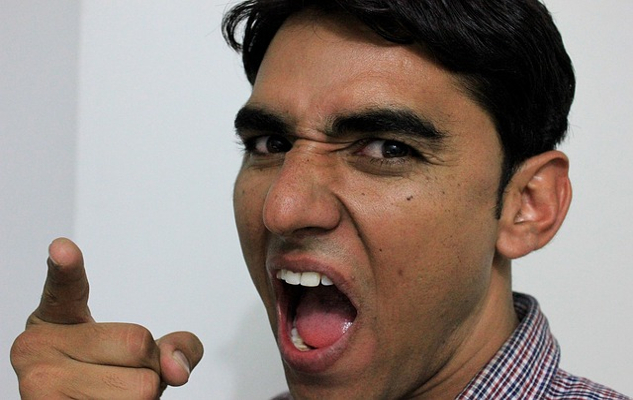
Image by ashish choudhary
When we say such things as "You hurt me," "You made me do it," "You made me angry," or "You make me crazy” we are giving in to the impulse to blame our feelings externally. Blaming others for what we’re experiencing creates feelings of separation and magnifies differences, thereby diminishing the amount of love we feel.
Placing the responsibility for the way we feel externally is how we avoid, rather than own, our anger or other emotions. We think, “I wouldn’t react so vehemently on the freeway if jerks wouldn’t drive the way they do.” We stay feeling in control by blaming some outside force for what we are experiencing. The reality is we are feeling angry and drivers are a convenient target. Putting our projections on others is a habit that keeps us from taking responsibility for our own feelings.
When we direct our attention outward onto other people, things, and situations we can consequently feel like a victim. Rather than owning our emotions as something that is going on inside ourselves, we believe that what we’re feeling is “their fault” and not our responsibility.
The Choice: Taking Responsibility or Blaming Others
We have a choice: Take personal responsibility for our experiences or blame it on something outside ourselves. It can sound trite but at every moment we choose what we'll think, feel, say, or do. We can choose to blame others or look within to see what’s really going on for us.
The long and short of "choice" is that we must own up to the fact that we alone are responsible for what we create in ourlives. No one can make us do or feel anything. It's time to take personal responsibility for our actions and reactions. Blaming others for our misery, plight, or bad behavior, only keeps us stuck in that mindset. To free ourselves, we must see the reality of where our feelings are coming from (ourselves) and then choose to respond differently.
To spare yourself and your world from missing out on feeling love, switch your thinking. You have a choice! The truth is: "I am responsible for what I think, feel, say, and do." If you need a boost to internalize this concept, I suggest you repeat one of the following "truths" at least a dozen times a day, at minimum, AND relentlessly interrupt your thoughts that try to justify diverting attention from your part in what you are feeling.
The truth is:
I am responsible for what I think.
I am responsible for what I feel.
I am responsible for what I say.
I am responsible for what I do.
I am responsible for my experience.
I am responsible for my life.
Focus: Outward vs Inward
I remember when I was just piecing together that there were only four rules of good communication, I became acutely aware on a visceral level of the difference between "you's" and "I's". I noticed that every time I was issuing a "you" I could literally feel in my body the wrongness of what I had just said. What a yucky feeling!
I also remember how good I felt when I spoke up and stated my opinion, wants, needs, feelings, boundaries, etc. about whatever the topic. I was putting myself out there and taking my place as an active contributing member of society.
Speaking our "I" is the epitome of taking personal responsibility. The very act of communicating this way makes us feel strong and proud about who we are.
Being the Target of the Anger and “Yous”
Reciprocally, being the target for other people’s feelings takes a toll on the recipient’s self-worth, health, and well-being. When we are repeatedly blamed for someone else’s behavior or feelings, we become afraid and defensive, waiting for the next strike. The end result is feeling misunderstood. Love takes a dive out the window.
Over time, we may internalize what the blamer says, and in the process we can get down on ourselves. This leaves us feeling hollow, a bit numb, sad, and afraid to share ourselves. We withdraw. In addition, we're pissed off at being unjustly blamed for others’ emotions, words and actions.
When You're Told You're the Cause of Other People’s Feelings
Here are two ways to avoid being drawn into someone’s poor communication style.
1. When you are the recipient of “yous,” matador them. Don't defend, argue, placate, explain, or try to offer your rational feedback. Like a matador, pull out your imaginary cape and let the BULL go by. Remind yourself: "They are out of their territory and ‘you-ing’ me. I won't take it personally." Then do a pirouette and get ready to dodge the next charge.
2. When someone projects their feelings on you, don't take the bait and respond. Don't try to strike back with similar tactics. Let their comments roll off your back. Pretend they are speaking a foreign language or reframe their cruel words by reminding yourself that they are feeling some emotion. You are merely the convenient target. The reality is: you are fine. They need to learn to communicate more lovingly and take responsibility for what they are feeling and experiencing.
When someone defaults to blaming you instead of looking within and sharing about what’s going on for them, it’s trouble all around. You can feel the difference between “You’re going to be the death of me” versus “I’m feeling scared,” between “You don’t care about me” rather than “I need a hug right now,” or “You make me angry” versus “I’m feeling angry right now because I wanted to get to the movie on time.
The Long and Short of It
Today when I find myself wanting to "you" or judge someone or see them in a less than positive light, I know that I'm definitely NOT accepting that "people and things are the way they are, not the way I want them to be." So, I remind myself that I need to accept what is, refocus on my quest to feel more joy, love, and peace myself, and speak about what’s true for me.
In closing, be on the lookout for “yous” that come flying in your direction, unless they are appreciations, and let them go flying by. And also, listen for any ‘yous’ that come out of your mouth or roll around in your head. Whatever we are experiencing is never about the other person. It’s always about us.
©2024 by Jude Bijou, M.A., M.F.T.
All Rights Reserved.
Book by this Author: Attitude Reconstruction
Attitude Reconstruction: A Blueprint for Building a Better Life
by Jude Bijou, M.A., M.F.T.
 With practical tools and real-life examples, this book can help you stop settling for sadness, anger, and fear, and infuse your life with joy, love, and peace. Jude Bijou's comprehensive blueprint will teach you to: ? cope with family members' unsolicited advice, cure indecision with your intuition, deal with fear by expressing it physically, create closeness by truly talking and listening, improve your social life, increase staff morale in just five minutes a day, handle sarcasm by visualizing it flying by, carve out more time for yourself by clarifying your priorities, ask for a raise and get it, stop fighting via two easy steps, cure kids' tantrums constructively. You can integrate Attitude Reconstruction into your daily routine, regardless of your spiritual path, cultural background, age, or education.
With practical tools and real-life examples, this book can help you stop settling for sadness, anger, and fear, and infuse your life with joy, love, and peace. Jude Bijou's comprehensive blueprint will teach you to: ? cope with family members' unsolicited advice, cure indecision with your intuition, deal with fear by expressing it physically, create closeness by truly talking and listening, improve your social life, increase staff morale in just five minutes a day, handle sarcasm by visualizing it flying by, carve out more time for yourself by clarifying your priorities, ask for a raise and get it, stop fighting via two easy steps, cure kids' tantrums constructively. You can integrate Attitude Reconstruction into your daily routine, regardless of your spiritual path, cultural background, age, or education.
For more info and/or to order this book, click here. Also available as a Kindle edition.
About the Author

Jude Bijou is a licensed marriage and family therapist (MFT), an educator in Santa Barbara, California and the author of Attitude Reconstruction: A Blueprint for Building a Better Life.
In 1982, Jude launched a private psychotherapy practice and started working with individuals, couples, and groups. She also began teaching communication courses through Santa Barbara City College Adult Education.
Visit her website at AttitudeReconstruction.com/

























